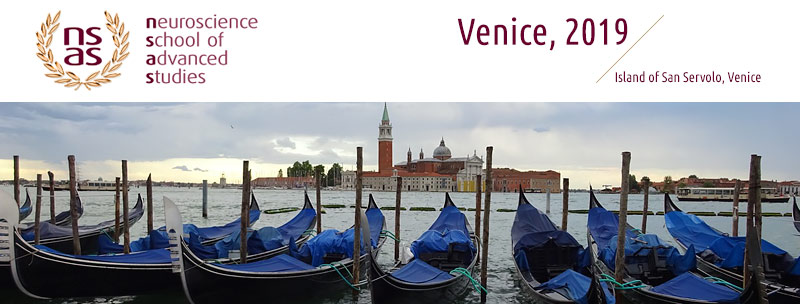
Coordinator: Chiara Cirelli (USA)
Faculty: Kenneth P. Wright, Cliff Saper, Giulio Tononi, Derk-Jan Dijk, Reto Huber, Yuval Nir
This Advanced Course will cut across multiple areas of sleep studies and will feature dedicated sessions addressing important emerging concepts. Emphasis will be placed on cutting-edge methods and hypotheses for understanding sleep and its effects on cognitive functions, and on how neurophysiological/genetic/imaging approaches can shed light on the functions of sleep and its essential role in maintaining and preserving vigilance, performance, learning and memory. Find out more
Advanced Courses: Spring-Summer 2019
Brain Somatic Mosaicism
May 11 — 18, 2019
Coordinator: Flora Vaccarino (USA)
Faculty: Fred H. Gage, Alexej Abyzov, Jan Vijg, Alexander E. Urban, Joris Vermeesch, Michael McConnell
Somatic mosaicism as pertinent to central nervous system development, function and disease is a rapidly emerging area of research. Somatic genomic variants encompass variation in genomic sequence, such as single nucleotide variations (SNV) and variation in genomic structure, such as copy number variations (CNV): the brain is therefore composed of cells with different genomes (mosaicism). Research on somatic mosaicism in disease will be scrutinized with the distinguished Faculty and the possible function of somatic mosaicism for normal development, early lineages tracing, aging, and various form of neurological and psychiatric conditions will be analyzed in depth. Find out more
Neural Stem Cells
Development and Brain Repair
May 18 — 25, 2019
Coordinator: Elena Cattaneo (Italy)
Faculty: Arnold Kriegstein, Magdalena Götz, Olivier Brüstle, Malin Parmar and others
Unprecedented advances have been made in our understanding of stem cells and through them much can be learned about the physiology and pathophysiology of the cells that degenerate in different brain disorders with the aim of delivering therapeutically relevant stem cells that could ameliorate the clinical outcome. The Advanced Course will bring together a distiguished group of investigators who are at the forefront of research and will showcase advances at the frontiers of neural stem cells for neurorepair. Find out more
Single Cell Omics
May 25 — June 1, 2019
Coordinator: Scott Fraser (USA)
Faculty: James Eberwine, Amy Herr, Jonathan Sweedler, Klaus Hahn, John Marioni, Ana Pombo
Studies exploiting new technologies for defining the connections in the brain, driving neuronal activity and modeling of neuronal processing are each hampered by our incomplete knowledge of the brain’s constituent parts. A bevy of single cell analyses are now being deployed to better understand the cells that constitute the functioning nervous system. These approaches offer insights into how cells function individually as the building blocks for understanding how they work in ensemble to create functional pathways. Find out more
Acute to Chronic Pain:
Plasticity and Therapeutic Perspectives
June 1 — 8, 2019
Coordinator: A. Vania Apkarian (USA)
Faculty: Stephen McMahon, Volker Neugebauer, Tony Dickenson, Giandomenico Iannetti, and others
Accumulating evidence points to brain reorganization with chronic pain. Both human brain imaging studies as well as animal model studies specifically interrogating the role of supraspinal plasticity consistently emphasize the role of brain plasticity in chronic pain. Brain functional network properties provide a signature for existence and for emergence of chronic pain both in humans and in animal models for pain chronification and studies show that early medication use is protective against development of chronic pain. Find out more
Neural Circuits of Social Cognition
June 8 — 15, 2019
Coordinator: Larry Young (USA)
Faculty: Richard Mooney, Christian Keysers, Hee-Sup Shin, Dayu Lin, Steven Phelps,Tali Kimchi
Social relationships and communication are essential for well-being, and adaptive social behaviors are essential for survival. Only recently have we begun to understand the neural circuit mechanisms regulating social behavior and its diversity in a rigorous way. Many psychiatric conditions are characterized by deficits in social interaction and communication, so it is essential that we understand the neural mechanisms and circuits regulating complex social behaviors in order to inform novel treatments for conditions such as the autism spectrum. Find out more
Novel Technologies for the Study of Cognitive Function
June 15 — 22, 2019
Coordinator: Alcino J. Silva (USA)
Faculty: Ed Boyden, Valentina Emiliani, Loren L. Looger, Michael Hausser, Frank Loren
This Advanced Course will cut across the latest published and unpublished ground-breaking approaches and technical developments in the study of cognitive function, such as novel optogenetic and chemogenetic tools to manipulate molecular, cellular and circuit function with unparalleled temporal and spatial resolution, emerging new in vivo imaging and electrophysiological techniques, powerful new developments in modeling, analyses, and behavioral approaches. Find out more
Cognitive Neuroscience of Thought
June 22 — 29, 2019
Coordinator: Rebecca Saxe (USA)
Faculty: Mina Cikara, Wil Cunningham, Marina Bedny, Hyowon Gweon, Elizabeth Redcay
Fascinating aspects of human psychology and cognition cannot be recreated in animal models, including pedagogy, morality, social group interactions, and complex decision making. Over the past five years, new experimental designs and analysis techniques have dramatically increased the power of noninvasive neuroimaging in humans to address these questions directly. Find out more
Protein Homeostasis and Cognitive Function
June 29 — July 6, 2019
Coordinator: Peter Walter (USA)
Faculty: Giovanna Mallucci, Judith Frydman, Kenneth Kosik, Soledad Matus, Susanna Rosi, Anne Bertolotti,
Mauro Costa-Mattioli (Co-Coordinator)
The brain must adapt to changes in conditions, which typically occur as a consequence of environmental and/or genetic factors. To deal with such challenges, the brain utilizes protein homeostasis networks, which are constituted by sensors of cellular distress, such as the mediators of the unfolded protein and the heat shock responses. These sensors engage effector molecules, such as molecular chaperones, which aid in protein folding, the ubiquitin-proteasome and autophagy systems that clear damaged proteins and the translational machinery that regulated protein synthesis rates. Find out more
A short sabbatical in Venice
A short sabbatical at the NSAS is offered to a limited number of established scholars.
Participants may attend all of the NSAS Advanced Courses of the Year 2019 and network extensively with the world leaders in the enchanting scenario of Venice.
Individuals holding a Faculty or equivalent position are considered as well as qualified scholars who are transitioning to a Faculty or an equivalent position in a company. Seats are limited.
|
Neuroscience School of Advanced Studies
Isola di San Servolo info@neurosas.org |
